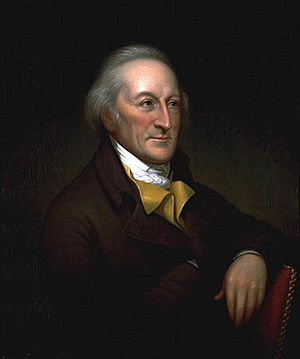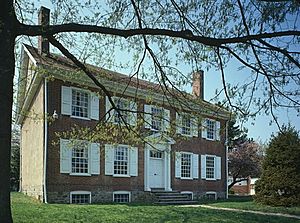George Clymer facts for kids
Quick facts for kids
George Clymer
|
|
|---|---|

Portrait by Charles Willson Peale
|
|
| Born | March 16, 1739 Philadelphia, Province of Pennsylvania, British America
|
| Died | January 23, 1813 (aged 73) Morrisville, Pennsylvania, U.S.
|
| Resting place | Friends Burying Ground Trenton, New Jersey |
| Known for | Founding Father of the United States |
| Spouse(s) |
Elizabeth Meredith
(m. 1765) |
| Children | 10 (9 with Elizabeth Meredith, 1 before marriage) |
| Signature | |
George Clymer (March 16, 1739 – January 23, 1813) was an American leader and one of the Founding Fathers of the United States. He is famous for being one of only six people who signed both the Declaration of Independence and the U.S. Constitution.
Clymer was a strong supporter of America's freedom from Great Britain. He was one of the first people to call for complete independence. He served in the Continental Congress and helped create the new nation's government.
Contents
Early Life and Family
George Clymer was born in Philadelphia, Province of Pennsylvania, on March 16, 1739. Sadly, his parents passed away when he was only one year old. He was raised by his aunt and uncle, Hannah and William Coleman, who trained him to be a merchant.
In 1765, he married Elizabeth Meredith. Together, they had nine children, but five of them died when they were very young. Their surviving children were Henry, John Meredith, Margaret, George, and Ann. His son, John Meredith, sadly died in 1787 during a protest known as the Whiskey Rebellion.
A Patriot for Independence
Clymer was a patriot, which meant he believed the American colonies should be free from British rule. He helped lead protests in Philadelphia against British laws like the Tea Act and the Stamp Act.
When the American Revolutionary War began, he joined a volunteer group to fight for independence. He was also a member of the Philadelphia Committee of Safety, which helped organize the city's defense.
Serving a New Nation
George Clymer dedicated much of his life to public service. He played important roles in the government both during and after the revolution.
In the Continental Congress
From 1776 to 1780, Clymer was elected to the Continental Congress, the group of leaders who governed the colonies during the war. He worked as a treasurer, helping to manage the money for the new country.
He was very brave. In 1776, when the British army was about to capture Philadelphia, many members of Congress left the city for safety. Clymer stayed behind with Robert Morris and George Walton to continue the important work of the government.

Helping Create the Constitution
In 1787, Clymer was chosen to represent Pennsylvania at the Constitutional Convention. This was a meeting where leaders from the states gathered to write the U.S. Constitution, the plan for the new government.
During the convention, Clymer worked with other leaders to decide how the government should be structured. He was one of the people who signed the final document, helping to create the United States of America as we know it today.
Later Career
After the Constitution was approved, Clymer was elected to the first U.S. Congress in 1789. He continued to serve his country in different ways.
He was the first president of The Philadelphia Bank and the Pennsylvania Academy of the Fine Arts. He also served as a vice-president of the Philadelphia Agricultural Society. In 1791, he was put in charge of collecting a new tax on spirits made in Pennsylvania.
Views on Slavery
George Clymer's relationship with slavery was complicated, as it was for many people of his time. When he was seven years old, he inherited an enslaved man named Ned from his father. This shows that his family owned enslaved people.
However, as an adult, Clymer worked to end the international slave trade. During the Constitutional Convention, he argued against bringing more enslaved people into the country. He was part of a committee that tried to find a compromise on the issue. Even though he was not successful in ending the trade right away, he was one of the early voices against it.
Death and Legacy
George Clymer died on January 23, 1813. He was buried in Trenton, New Jersey.
His contributions to the United States are still remembered today. Several places are named in his honor, including:
- The ship USS George Clymer (APA-27)
- The towns of Clymer, Pennsylvania, and Clymer, New York
- George Clymer Elementary School in Philadelphia
- Streets in Reading and Indiana, Pennsylvania
His former home, known as Summerseat, is now a historic site in Morrisville, Pennsylvania.
See also
 | Claudette Colvin |
 | Myrlie Evers-Williams |
 | Alberta Odell Jones |

